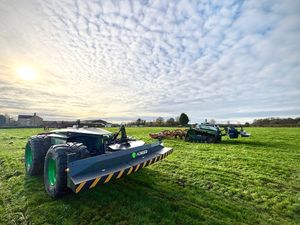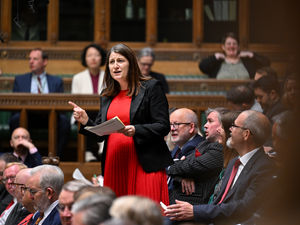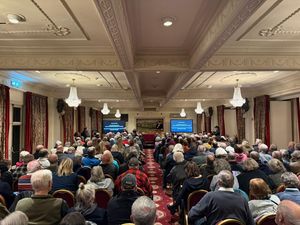Sharing in the success
With rising production costs and aggressive supermarket buying practices, farmers are finding that profit margins are tighter than ever been - if they are there at all. With rising production costs and aggressive supermarket buying practices, farmers are finding that profit margins are tighter than ever been - if they are there at all. But two Shropshire arable farmers have proved that sharing the load can help ease the burden as well as improve efficiency. Tim Cooke of Bratton Hall Farm, Telford, and Rob Morgan of Home Farm, Acton Burnell, got together to share their workload and machinery after the demise of Allscott's sugar beet factory and soon learned the benefits of working together. The pair now share a workman, work each other's land and have begun to improve their machinery by selling old kit to buy better and bigger equipment together. Read the full story in today's Shropshire Star.
 With rising production costs and aggressive supermarket buying practices, farmers are finding that profit margins are tighter than ever been - if they are there at all.
With rising production costs and aggressive supermarket buying practices, farmers are finding that profit margins are tighter than ever been - if they are there at all.
But two Shropshire arable farmers have proved that sharing the load can help ease the burden as well as improve efficiency.
Tim Cooke of Bratton Hall Farm, Telford, and Rob Morgan of Home Farm, Acton Burnell, got together to share their workload and machinery after the demise of Allscott's sugar beet factory and soon learned the benefits of working together.
The pair now share a workman, work each other's land and have begun to improve their machinery by selling old kit to buy better and bigger equipment together.
The decision to work together came last year when Tim knew he would have to let his experienced tractor driver Paul Wagg go after the final sugar beet harvest was over.
"Without the sugar beet I could not justify a full-time worker, especially during the winter months, but having mentioned it to Rob in passing it made sense to share him between us," he said.
Tim farms 800 acres split between Telford and Harnage near Shrewsbury and Rob farms 400 acres a few miles from Harnage, at Acton Burnell. "Paul keeps a timesheet so we know where he's been working and we share his holiday pay between us," Tim explained.
Both farmers grow similar crops - wheat, oilseed rape, barley. Tim also grows industrial rape and lets out grass and potato ground while Rob has triticale, winter oats and stubble turnips for sheep keep and grass for silage in his mix.
"The joint venture works for us because we have a similar mindset. We both aim for good yields and quality while keeping costs down," explained Rob.
Sharing has brought fresh ideas into the farming mix and they are keen to try out new techniques after discussing things.
They are both tidy farmers too and have the same aspirations and skills in operating and maintaining equipment. "Working together has made farming more fun and puts more structure into the day," Tim said.
This year they started Soil N-min testing to ascertain nitrogen reserves in soil before growing oilseed rape. This lets them apply nitrogen only where needed in the prime pre-flowering period, which they believe is saving around £20 per hectare in nitrogen which previously would have been applied in excess of crop needs.
"We farm separately but carry out the farming operations jointly," Tim explained. "There has to be some give and take and flexibility for it to work and you have to lay the ground rules down from the outset."
Each machine has its own logbook so that time can be accurately recorded on each farm and each machine has its own set hourly operating cost which can be allocated according to usage.
"We set the rates to cover the cost of running the particular machine and we try and get the machinery usage to contract out so we don't end up passing money over," he said. They also sold some of their older kit to jointly buy more efficient equipment.
Having streamlined their joint venture they are now looking for more acres.





